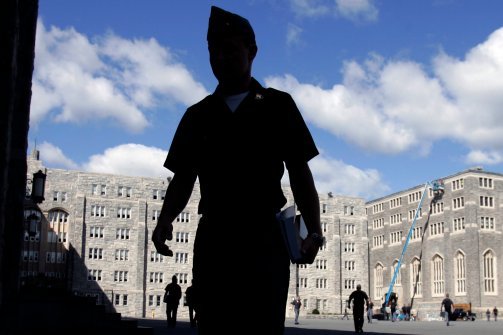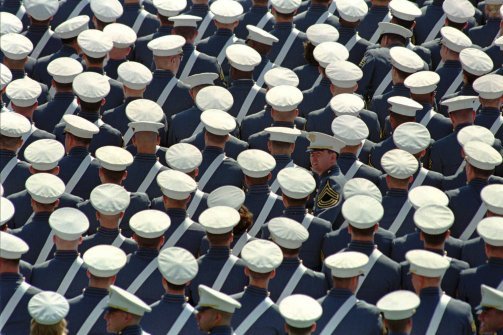Despite granting waivers to allow minorities to maintain their religious dress while serving, military policy still keeps most of them out. But the successes of the waivers have proved that ending the discrimination will give us stronger, more diverse armed forces.
May 10, 2013: The rash of hate crimes following the Boston Marathon bombings reminds us of the major challenges religious minorities face in this country. Last week a taxi passenger in Northern Virginia verbally and physically attacked his driver for being “a fu***** Muslim.” The victim, Mohamed Salim, who served with the U.S. Army in Iraq and currently serves as an Army Reservist, was left with a fractured jaw. This week in California, an 81-year-old Sikh man was brutally assaulted with a steel pipe in a suspected hate crime, from which he suffered a fractured jaw, punctured lung, and head injuries.

West Point, Mike Groll/AP
While the police investigate whether or not to charge the attackers with hate crimes, politicians and community leaders continue to explore ways to minimize hate-biased violence and facilitate the integration of diverse communities in modern America. The U.S. military has an opportunity to contribute in this regard by opening its doors to various religious minorities, many of whom remain marginalized.
In January, the military announced that it would allow women to serve in combat roles. Although long overdue, this announcement comes as no surprise given that the Armed Forces has opened its arms to a variety of communities over the past several years.
Despite this progress, a number of religious minorities are still barred from serving in the military. Sikh, Jewish, and Muslim Americans are among the many communities affected by a policy that does not allow military personnel to adhere to their religion’s articles of faith, usually involving dress or personal appearance, and members from these groups have been working diligently to repeal the policy.
For example, Rabbi Menachem Stern filed a federal discrimination lawsuit against the Army for the right to serve while maintaining his facial hair, which he considered to be an article of faith. In 2011, the Army agreed to a deal that would allow the rabbi to serve as a chaplain and keep his “unshorn beard in a neat and orderly manner while serving in the Army.”
Like Rabbi Stern, three turbaned Sikhs have received exceptions to the Army’s grooming policy and have been allowed to serve in the military. In 2009, Simranpreet Singh Lamba enlisted for and was recruited by the Army, and he applied for a waiver to maintain his Sikh articles of faith. After a 10-month review, the Army approved Lamba’s waiver given that the “religious accommodations would not affect training, unit readiness or cohesion, individual readiness, morale, discipline or safety and health; and as long as proper appearance and guidelines were maintained.”
The fact that the Army has recruited, enlisted, and provided religious accommodations for two more turbaned Sikh Americans indicates that religious minorities can meet the Army’s expectations and go beyond them. In a 2010 interview, Lamba explained that his articles of faith do not affect his duties as a soldier. “I’m wearing the same uniform. There’s nothing about my beard and hair that would stop me from excelling as a soldier. I can do everything other soldiers do. I have the same flag on my right arm. I’m doing the same thing, defending the same country.”

WEST POINT GRADUATION, Paul Buckowski/AP
|
|
| As major institutions around the world work to establish equal rights and equal opportunities for all citizens, the military ought to be ahead of the curve, not behind it. |
|
|
Although these individuals have received exemptions from the grooming standard, the official policy does not currently allow individuals to maintain religiously mandated articles of faith. In the federal discrimination lawsuit filed and settled by Rabbi Stern, the assistant U.S. attorney argued that facial hair obstructs the use of protective masks. But the three Sikhs who currently serve in the U.S. Army have successfully created seals with their protective mask over their facial hair. Concerns with placing protective masks on people with beards first emerged during World War I, but technology has developed enough over the past century to render this a moot issue.
Another common argument is that soldiers with religious headwear take on additional risk because they cannot wear helmets. But religious minorities have long worn helmets over these articles of faith, including those who have recently received exemptions from the Army. There is no reason to believe that this is a legitimate concern for communities such as Jews, Sikhs, or Muslims.
America has long stood for the rights and protections of its minority communities, and at times, it seems as if we are bending over backward or offering preferential treatment to include others. But as we have seen time and time again, including minority religious communities has strengthened and enriched our societies. We are starting to see key institutions modernize their policies to embrace religious diversity and account for religiously mandated articles of faith. In September 2012, California Gov. Jerry Brown signed into law the Workplace Religious Freedom Act, the strongest and most comprehensive equal employment legislation in the country. Among other issues, this act forbids segregation of individuals who wear religious articles, such as facial hair or head coverings. Furthermore, a few months ago, the British Army and the Scots Guard modernized its policies by allowing a Sikh soldier to wear his turban rather than the traditional bearskin cap while guarding Buckingham Palace in London, England.
Our country has a long tradition of preserving the freedoms of our religious minorities, and the U.S. military can now initiate a process of orderly inclusion. As major institutions around the world work to establish equal rights and equal opportunities for all citizens, the military ought to be ahead of the curve, not behind it. By modernizing its policies to include religious minorities in the service, the U.S. Armed Forces can help pave the way toward a more pluralistic, progressive, and peaceful society in the land of the free and home of the brave.
Simran Jeet Singh is a scholar and activist who writes primarily on culture and religion. He has contributed regularly to a wide range of publications, including The New York Times, The Washington Post, and The Huffington Post. He has earned degrees from three universities – Harvard, Columbia, and Trinity – and he is currently completing his Ph.D. at Columbia University. Follow @SimranColumbia





